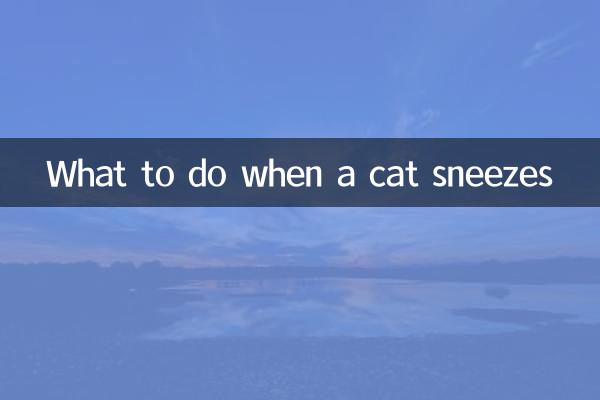What to do when a cat sneezes
In the past 10 days, the topic of pet health has caused widespread discussion on social media, especially the issue of cat sneezing. Many pet owners are concerned about their cats' frequent sneezing and don't know if they need medical attention or how to care for them at home. This article will combine popular discussion content across the Internet to answer this question in detail and provide structured data and suggestions.
1. Common causes of sneezing in cats

Cats sneeze for a variety of reasons, some are temporary, and others may require veterinary intervention. Here are some common reasons:
| reason | symptom | Do you need medical attention? |
|---|---|---|
| Irritation from dust or foreign matter | Occasional sneezing, no other symptoms | Usually not required |
| upper respiratory tract infection | Frequent sneezing with a runny nose or eye discharge | need |
| allergy | Seasonal sneezing, which may be accompanied by itchy skin | It depends on the situation |
| Foreign body in nasal cavity | Severe sneezing, possibly accompanied by nosebleeds | need |
2. How to judge whether medical treatment is needed?
Whether your cat needs medical attention when sneezing can be initially judged through the indicators in the following table:
| index | suggestion |
|---|---|
| sneezing frequency | Observable occasionally (1-2 times/day); frequent (multiple times/hour) requires medical attention |
| accompanying symptoms | Runny nose, eye discharge, and decreased appetite require medical attention. |
| duration | If there is no relief for more than 3 days, you need to seek medical treatment. |
3. How to care for a sneezing cat at home?
If your cat's sneezing is mild, you can try the following home care methods:
1.Keep the environment clean: Regularly clean away dust and foreign objects in your home, especially in areas where cats frequent.
2.Use a humidifier: Dry air may irritate your cat’s nasal cavity, and a humidifier can relieve discomfort.
3.Watch your diet and activities: Make sure the cat’s appetite and mental state are normal, and seek medical attention promptly if there are any abnormalities.
4. Summary of popular discussions on the entire network
In the past 10 days, discussions about cat sneezing have mainly focused on the following issues:
| Popular questions | Discussion popularity |
|---|---|
| Does a cat sneezing require immediate medical attention? | high |
| How to differentiate between allergies and infections? | middle |
| Effective methods for home care | high |
5. Professional advice from veterinarians
According to the advice of veterinarians in popular discussions across the Internet, the following situations require immediate medical attention:
1. Sneezing accompanied by yellow or green discharge.
2. The cat has difficulty breathing or a significant decrease in appetite.
3. The sneezing lasts for more than a week.
Conclusion
Although cat sneezing is common, as pet owners we need to pay close attention to its symptoms and frequency. With the structured data and advice in this article, you can better determine your cat's health and take appropriate action. If symptoms persist or worsen, be sure to contact your veterinarian promptly.

check the details

check the details